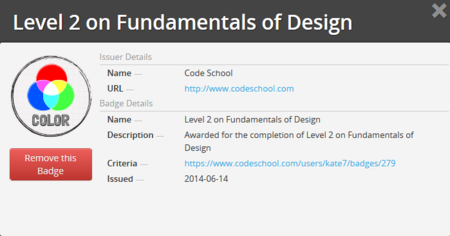Documentation:OpenBadges/Faculty Guide/Web Design/Learn/Introduction
Introduction to Open Badges
| Video: MacArthur Foundation |
Digital Badges
Badges have long been used as a show of evidence of achieving a particular skill or competency. You may have achieved a badge as an award for achievement in sport or community activities like Scouts or Guides. A digital badge is an online representation of a skill or competency earned. For example, digital badges are used in gaming to reward players for achieving certain levels of mastery, unlocking puzzles or contributing to a particular community. Digital badges and can be used to motivate, recognize, and provide evidence for the achievement of competencies, skills and contributions at a more granular level than a credential such as a certificate or degree. Such competencies may include writing a piece of code, configuring a database, organizing a community conference, getting a high peer rating on a blog article or online community contribution.
Open Badges
Open badges extend the digital badge concept by allowing for verification of skills, interests and achievements "through credible organizations and attaches that information to the badge image file, hard-coding the metadata for future access and review. Because the system is based on an open standard, earners can combine multiple badges from different issuers to tell the complete story of their achievements — both online and off." (Mozilla, 2014)
Potential Benefits
Benefits associated with open badges include capturing of the earner's complete learning path in a way that allows for portability, so the earner can display the badge on a variety of web spaces. Since the badge carries with it information about assessment, evidence and other metadata linked back to the badge issuer, it can signal achievement to potential employers. In terms of learning, open badges have the potential to "motivate engagement and collaboration; improve retention and leveling up in learning; support innovation and flexibility in developing the skills that matter; and building and formalizing identity and reputation within learning communities." (Knight, Assessing Digital Badges)
Open badges are issued, stored and displayed online. The badge goes through a "baking" process which attaches information, or metadata, to the badge. This metadata clarifies the skill earned, and can help persuade the viewer that the badge claims are authentic. Metadata may include the following information:
- Badge name
- Description
- Criteria for earning
- Issuer
- Link to artifact of the earner's work
- Date issued
Sharing Badges

|
| Example of Open Badge Metadata from Code School |
One of the main drivers of the Open Badge movement is the Mozilla Foundation, who have developed badge interoperability across websites and provided the public with free accounts to store and share their badges. These accounts are called “Backpacks,” and they enable the earner to create “collections” of badges and to selectively export these collections to social media accounts, such as Facebook, Twitter, Google+, and LinkedIn. UBC's open badge implementation in WordPress allows users to store and share earned badges automatically through Credly.
The online sharing of open badges has many benefits, including the following:
- Earners can represent themselves with a complex of verifiable skills
- Employers and others can find people with certain skills
- Earners can find people with similar badges, and build a network